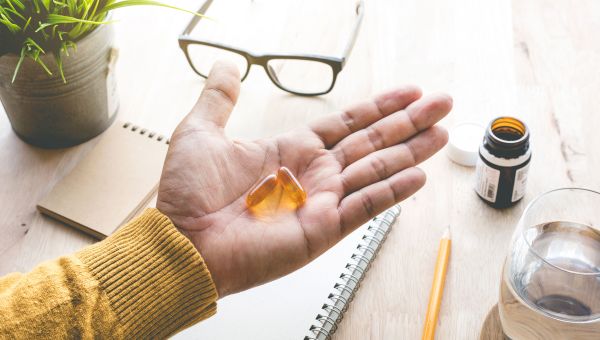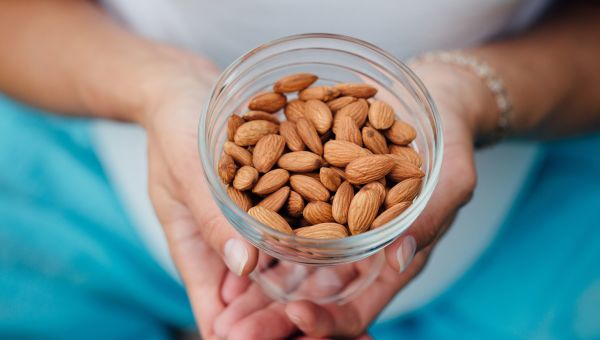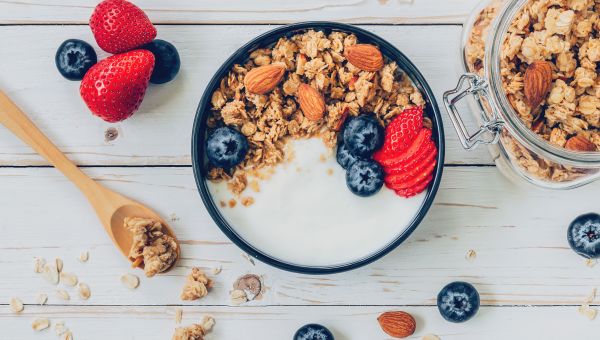7 supplements you probably don’t need
Before you stock up at the pharmacy, know that most people can get nearly all their essential vitamins and minerals from food.
Updated on September 10, 2024

According to the National Institutes of Health (NIH), most adults and children in the United States take dietary supplements or vitamins. Although the U.S. Food and Drug Administration regulates supplements somewhat once they hit the shelves, the products don’t have to be proven safe or effective before they’re sold.
And here’s another thing: Most people can get… Show More
According to the National Institutes of Health (NIH), most adults and children in the United States take dietary supplements or vitamins. Although the U.S. Food and Drug Administration regulates supplements somewhat once they hit the shelves, the products don’t have to be proven safe or effective before they’re sold.
And here’s another thing: Most people can get their necessary nutrients by eating a well-balanced diet, rich in fruits, vegetables, healthy fats, whole grains, and lean meats.
“I would rather have people eating a good diet and getting their vitamins that way,” says Keith Roach, MD, associate professor of clinical medicine at Weill Medical College of Cornell University in New York City and an associate attending physician at New York-Presbyterian Hospital. Here's what you need to know about seven popular supplements, including who might need to take them and who can probably skip them.
Show Less
Advice about vitamins
There are two large classes of vitamins: fat-soluble and water-soluble. Fat-soluble vitamins—such as A, D, E, and K—are stored in the body’s fatty tissue. It’s not likely you’ll consume too much of these vitamins through food, but overdoing supplements containing these could cause headaches, nausea,… Show More
There are two large classes of vitamins: fat-soluble and water-soluble. Fat-soluble vitamins—such as A, D, E, and K—are stored in the body’s fatty tissue. It’s not likely you’ll consume too much of these vitamins through food, but overdoing supplements containing these could cause headaches, nausea, dizziness, and liver damage. Water-soluble vitamins—like vitamins B and C—leave the body through urine, which means a little bit of excess intake is relatively harmless because they tend not to build up in the body.
Before you take any supplements, talk to your healthcare provider (HCP). They can help you figure out what’s appropriate to take. “When you're talking about doing something to prevent a problem, where there's nothing wrong, there ought to be a very high threshold of making sure that what you're going to do is safe and effective,” Dr. Roach says.
And a quick tip about gummy vitamins: If you need to take supplements and gummies are all you have, they’re probably better than nothing at all. However, reports from ConsumerLab.com have suggested that gummies are less likely than pill versions of vitamins to contain the amounts of nutrients claimed on the label. (ConsumerLab.com is a private company that conducts independent testing of health and nutrition products.) Not to mention, a lot of gummy options are high in sugar. Talk to your HCP to determine the right form for you.
Show Less
Multivitamins
People who can’t get enough of their necessary nutrients through diet alone—such as pregnant or breastfeeding people or older adults—might benefit from supplements. But you shouldn’t rely on a vitamin to supplement a poor diet.
On the other hand, healthy adults who eat a nutritious diet won’t… Show More
People who can’t get enough of their necessary nutrients through diet alone—such as pregnant or breastfeeding people or older adults—might benefit from supplements. But you shouldn’t rely on a vitamin to supplement a poor diet.
On the other hand, healthy adults who eat a nutritious diet won’t likely benefit from taking a daily supplement, according to the NIH. There is also insufficient evidence to suggest taking a multivitamin will help prevent chronic conditions like heart disease and cancer.
“I don't recommend multivitamins as a general rule,” Roach says.
Show Less
Vitamin D
According to the NIH, nearly 25 percent of people in the U.S. have vitamin D blood levels that are too low. For people between 1 and 70 years old and those who are pregnant or breastfeeding, the daily recommended amount is 600 international units (IU). For those older than 70, the recommended… Show More
According to the NIH, nearly 25 percent of people in the U.S. have vitamin D blood levels that are too low. For people between 1 and 70 years old and those who are pregnant or breastfeeding, the daily recommended amount is 600 international units (IU). For those older than 70, the recommended amount is 800 IU.
Certain groups have a higher risk for low levels of vitamin D, including breastfed infants, older adults, people with darker skin, and those who live in regions with fewer months of sunshine.
Low vitamin D levels might also affect people with health conditions that impact how much fat they absorb, since fat and vitamin D are absorbed at the same time. Lastly, people with obesity or those who have had gastric bypass surgery may require a higher intake of vitamin D.
This vitamin is essential to the health and strength of your bones, and deficiency may be linked to the development of osteoporosis, a condition that causes bones to become brittle and weak. But taking vitamin D supplements isn't helpful for everyone, according to the NIH. Taking vitamin D alongside calcium supplements may raise bone density numbers a little bit, but research hasn’t really shown that these supplements help prevent falls or fractures in older adults.
Instead of taking supplements, most people should aim to reach the recommended amount of vitamin D each day through diet and lifestyle approaches, such as:
- Eating fatty fish: A three-ounce serving of salmon contains 570 IU.
- Drinking fortified 2 percent milk: One eight-ounce glass contains 120 IU.
- Getting sunlight: Vitamin D is naturally produced by the body when the skin is exposed to sunlight. Just don't overdo the sunbathing. Getting too much sun can increase your odds of skin cancer, particularly if you have risk factors like fair skin or a personal or family history of the disease. Be sure to protect yourself by wearing UVA- and UVB-blocking sunglasses, and broad-spectrum sunscreen with an SPF of at least 15.
Healthcare providers (HCPs) may recommend supplements to patients with low levels of vitamin D, but if you’re not deficient, adding these pills to your daily routine is probably not necessary.
Although it’s important for heart and overall health to get the proper amount of vitamin D from diet and sunlight, taking vitamin D supplements isn’t likely to lower your risk of cancer or heart disease. In some cases, taking vitamin D supplements could actually raise your blood pressure or slightly increase your risk for cancer.
Show Less
Vitamin A
This fat-soluble vitamin is important for eye health and the growth and formation of cells. Vitamin A comes in two forms, preformed and provitamin A. When provitamins, like beta-carotene, enter the body, they’re converted into vitamin A.
Fruits and veggies like carrots, kale, and cantaloupe are… Show More
This fat-soluble vitamin is important for eye health and the growth and formation of cells. Vitamin A comes in two forms, preformed and provitamin A. When provitamins, like beta-carotene, enter the body, they’re converted into vitamin A.
Fruits and veggies like carrots, kale, and cantaloupe are high in beta-carotene. Preformed vitamin A, meanwhile, can be found in milk and eggs. Most Americans get enough vitamin A, which means having a deficiency isn’t likely.
According to the NIH, on average, men ages 14 and older need about 900 micrograms of retinol activity equivalents (mcg RAE) of vitamin A, and women need about 700 mcg RAE. Adults who are pregnant need about 770 mcg RAE, while lactating adults need about 1,300 mcg RAE. Just one-half cup of boiled or frozen spinach contains nearly 600 mcg RAE, and a baked sweet potato offers more than 1,400 mcg RAE, so you can likely reach your daily goals through diet.
If you consume too much preformed vitamin A from supplements—which is pretty easy to do—you might experience dizziness, skin irritation, or pain in joints and bones. You’re probably better off tossing together a colorful salad instead of taking a pill.
Show Less
Vitamin E
Not many people in the United States are deficient in vitamin E, a fat-soluble vitamin that protects cells from damage and provides support for your immune system. Vitamin E is abundant in foods like avocado, almonds, and spinach, making supplements unnecessary for most. Healthy adults need about… Show More
Not many people in the United States are deficient in vitamin E, a fat-soluble vitamin that protects cells from damage and provides support for your immune system. Vitamin E is abundant in foods like avocado, almonds, and spinach, making supplements unnecessary for most. Healthy adults need about 15 milligrams of the nutrient each day. Need some easy ways to get vitamin E in your diet?
- Snack on a handful of almonds: A one-ounce serving contains nearly 7 milligrams.
- Try some peanut butter: Two tablespoons contain about 3 milligrams.
- Cook some veggies: A cup of boiled broccoli and a cup of boiled spinach together will offer a little more than 6 milligrams total.
People who have conditions that prevent proper digestion or absorption of fat—like Crohn’s disease—might benefit from taking vitamin E supplements. Deficiencies of this vitamin can cause nerve and muscle damage and trigger vision problems. Symptoms of vitamin E deficiency include altered or diminished reflexes and muscle weakness. But before you pop a pill, talk to an HCP. Overdoing these supplements could cause other issues, like bleeding.
Show Less
Vitamin B12
Your body needs this B vitamin for several reasons, including proper formation of DNA and blood cells. This nutrient is only naturally present in animal products and byproducts, like meat, milk, and yogurt, or fortified foods like breakfast cereals. Most adults should get about 2.4 micrograms of… Show More
Your body needs this B vitamin for several reasons, including proper formation of DNA and blood cells. This nutrient is only naturally present in animal products and byproducts, like meat, milk, and yogurt, or fortified foods like breakfast cereals. Most adults should get about 2.4 micrograms of this nutrient daily.
Older adults and people who eliminate animal products from their diet, like vegans, are at a higher risk of B12 deficiency. People who regularly take metformin for diabetes or proton pump inhibitor (PPI) medicine for conditions that cause acid reflux may also be at risk for vitamin B12 deficiency. These shortages can be hard to track, developing slowly or progressing rapidly, and they can cause symptoms like hand and foot numbness, jaundice, and fatigue. What’s more, these symptoms are often overlooked or mistaken for other conditions. Severe deficiencies of B12 may cause depression, memory loss, incontinence, and more.
“If you're vegan, you need to be taking supplemental vitamin B12, because you can't get vitamin B12 in a vegan diet,” Roach says.
Show Less
Vitamin C
Fruits and veggies, like bell peppers, oranges, and kiwi, are loaded with vitamin C, which is good for the growth and repair of tissue, collagen production, and wound healing. (Collagen is a protein in the body that is a main part of tissues, such as skin, muscle, bone, tendons, and cartilage.)… Show More
Fruits and veggies, like bell peppers, oranges, and kiwi, are loaded with vitamin C, which is good for the growth and repair of tissue, collagen production, and wound healing. (Collagen is a protein in the body that is a main part of tissues, such as skin, muscle, bone, tendons, and cartilage.) People who get the recommended servings of fruit and veggies per day should have no trouble getting enough vitamin C. Deficiency isn’t common in developed countries, like the U.S., but can still occur in people who have limited access to a variety of foods.
How much vitamin C does your body need per day? It depends on your sex assigned at birth and stage of life:
- Men: 90 milligrams
- Women: 75 milligrams
- Pregnant women: 85 milligrams
- Breastfeeding women: 120 milligrams
If you have vitamin C deficiency, add some red pepper and citrus to your meals. One cup of raw sweet red pepper contains 95 milligrams, and one orange contains 70 milligrams. Vitamin C is water-soluble, so a little extra should safely find its way out of your body.
Show Less
Omega-3 Fatty Acids
In most cases, adults can get enough omega-3 fatty acid from the food they eat.
The NIH recommends that women get 1.1 grams each day, while men are advised to get 1.6 grams daily. Pregnant and breastfeeding people should get between 1.3 and 1.4 grams per day.
The American Heart Association doesn’t… Show More
In most cases, adults can get enough omega-3 fatty acid from the food they eat.
The NIH recommends that women get 1.1 grams each day, while men are advised to get 1.6 grams daily. Pregnant and breastfeeding people should get between 1.3 and 1.4 grams per day.
The American Heart Association doesn’t recommend people take omega-3 supplements unless they’re at a very high risk of getting heart disease, and research hasn’t yet shown that omega-3 supplements can lower the risk of cancer.
With a variety of conditions, including age-related macular degeneration, dry eye disease, and dementia, omega-3 supplements don’t seem to help, even though diet-based omega-3s (from food) do seem to help. One condition that has shown some positive effects from omega-3 supplements is rheumatoid arthritis, but it’s not clear how exactly it helps, and more research is needed.
Canola oil, salmon, herring, mackerel, chia seeds, and walnuts are all high in omega-3s. If you're looking to boost your fatty acid intake, try making chia pudding: Combine two tablespoons of chia seeds with one-half cup almond milk and top with chopped walnuts.
Show Less
National Institutes of Health. Dietary Supplements: What You Need to Know. Page updated January 4, 2023.
U.S. National Library of Medicine MedlinePlus. Vitamins. Page last reviewed January 19, 2023.
Cooperman, Tod. Are gummy vitamins better or worse than pills? ConsumerLab.com. Page last updated November 3, 2022.
National Institutes of Health. Multivitamin/mineral Supplements: Fact Sheet for Consumers. Page updated February 15, 2024.
National Institutes of Health. Vitamin D: Fact Sheet for Consumers. Page updated November 8, 2022.
National Institutes of Health. Vitamin D: Fact Sheet for Health Professionals. Page updated September 18, 2023.
National Institutes of Health. Vitamin A and Carotenoids: Fact Sheet for Health Professionals. Page updated December 15, 2023.
National Institutes of Health. Vitamin A and Carotenoids: Fact Sheet for Consumers. Page updated August 12, 2022.
National Institutes of Health. Vitamin E: Fact Sheet for Consumers. Page updated March 22, 2021.
National Institutes of Health. Vitamin E: Fact Sheet for Health Professionals. Page updated March 26, 2021.
National Institutes of Health. Vitamin B12: Fact Sheet for Consumers. Page updated December 15, 2023.
National Institutes of Health. Vitamin C: Fact Sheet for Consumers. Page updated March 22, 2021.
National Institutes of Health. Vitamin C: Fact Sheet for Health Professionals. Page updated March 26, 2021.
Harvard T.H. Chan School of Public Health: The Nutrition Source. Collagen. Page last reviewed May 2021.
National Institutes of Health. Omega-3 Fatty Acids: Fact Sheet for Consumers. Page updated July 18, 2022.
National Institutes of Health. Omega-3 Fatty Acids: Fact Sheet for Health Professionals. Page updated February 15, 2023.
More On


video

article


video


video


video
